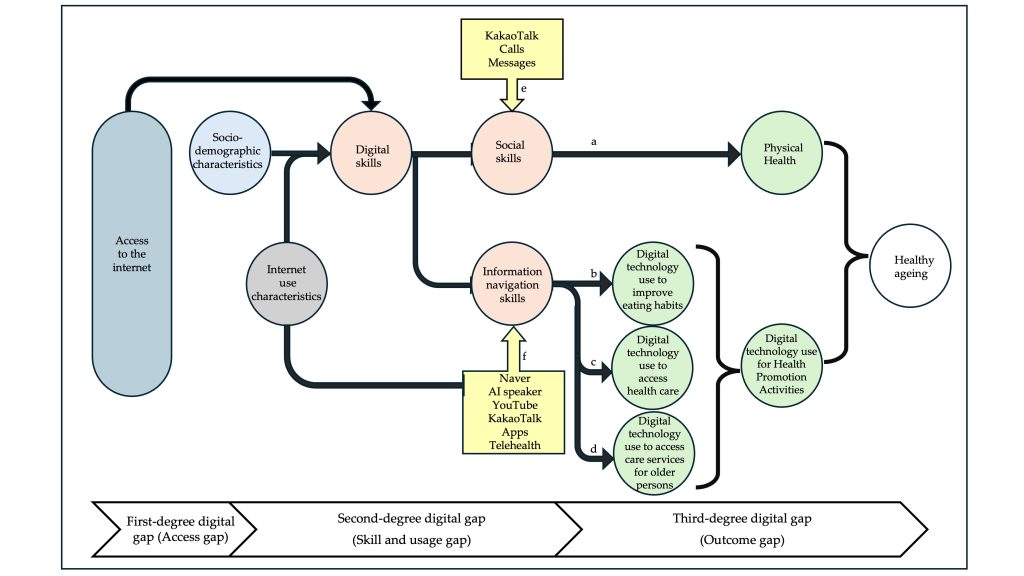Press Release: DIHAC study publication about digital inclusion among community older adults in the Republic of Korea
New Research Article from DIHAC study
A Mixed-method study of Community Older Adults’ Digital Skills and Health Consequences in the Republic of Korea
As the world is rapidly transforming into digital society, it is important to ensure that older adults are getting full benefit from the internet and digital technology. A recent article from the DIHAC study titled “Digital Inclusion among Community Older Adults in the Republic of Korea: Measuring Digital Skills and Health Consequences” published on the European Journal of Investigation in Health, Psychology and Education (Impact Factor 3.0) has revealed that many older adults with higher level of digital skills are more likely to apply digital technology for health promotion, leading to healthy ageing. The study reported the evidence of digital inclusion whereas existing digital divides among the older persons in the world leading country of digitization and AI.
This study is part of the ongoing study “Digitally Inclusive, Healthy Ageing Communities (DIHAC): A Cross-Cultural Study in Japan, Republic of Korea, Singapore, and Thailand”, funded by the Japanese Ministry of Education, Culture, Sports, Science and Technology, Grant-in-Aid for Scientific Research [grant numbers 21H00795, 23K20657], lead by Primary Investigator Associate Professor Myo Nyein Aung. DIHAC team is a collaboration of Yonsei University, ROK, Singapore University of Social Sciences, Singapore, Chiang Mai Rajabhat University, Thailand and Juntendo University, Japan. Furthermore, Emeritus Professor Jan A.G.M. van Dijk co-authored this paper. The first author Thet Htoo Pan is affiliated to the Department of Global Health Research, Juntendo University, Tokyo Japan as PhD candidate.
This research was motivated by the growing concern that the digital divide could worsen existing health disparities among the ageing population. Republic of Korea, a nation known for its technological advancements and population ageing, faces a unique challenge as its older adults struggle to keep pace with the digitalization. The study, conducted by the DIHAC study researchers in response to these concerns, aimed to measure the digital skills of older adults and assess the health consequences of grey digital divide.
This study highlights that the five types of digital skills: operational internet skills, information navigation skills, social skills, creative skills, and mobile skills; positively influence the health outcomes of Korean older adults. Enhanced social skills boost self-rated health, while information navigation skills improve access to healthcare, long-term care services and healthy-lifestyle information. Utilizing native Korean language platforms like Naver and Kakao Talk fosters social connections and healthy behaviors. Challenges include skill development for initial and sustained use. Policy recommendations emphasize promoting digital literacy among older adults for active and healthy ageing.

Figure. Conceptual framework constructed with the summary of the findings for digitally inclusive, healthy ageing communities (DIHAC) in the Republic of Korea context; a (β = 0.36, 95%CI = 0.07, 0.65, p-value < 0.05); b (β = 0.43, 95%CI = 0.09, 0.77, p-value < 0.05), c (β = 0.53, 95%CI = 0.21, 0.85, p-value < 0.05), d (β = 0.45, 95%CI = 0.11, 0.79, p-value < 0.01), e, f qualitative findings. Pan et al. (2024)/ European Journal of Investigation in Health, Psychology and Education/ DOI: https://doi.org/10.3390/ejihpe14080154.
To address the challenges of grey digital divide, the study advocates for the implementation of digital literacy training programs tailored for older adults. Such programs could empower this demographic, enabling them to access vital health information, stay connected with loved ones, and participate more fully in society. The research team believes that by empowering the digital inclusion of older adults, health outcomes for older adults can be improved and foster greater social inclusion.
The implications of this research are far-reaching, with the potential to influence public health policies and inspire similar studies in other countries facing the challenges of an ageing population. By addressing the digital inclusion among older adults, the DIHAC study can set a precedent for how nations and communities can support their ageing populations in the digital era.
For more information, please read the full article here.
The authors would like to thank all those involved for working together.
Reference
| Authors | Thet Htoo Pan 1, Myo Nyein Aung 1,2,3,*, Eun Woo Nam 4, Yuka Koyanagi 5, Hocheol Lee 6, Li Li 1, Myat Yadana Kyaw 1, Nadila Mulati 1, Saiyud Moolphate 7, Carol Ma Hok Ka 8, Jan A.G.M. van Dijk 9 and Motoyuki Yuasa 1,2 |
| Title of original research article | Digital Inclusion among Community Older Adults in the Republic of Korea: Measuring Digital Skills and Health Consequences |
| Journal | European Journal of Investigation in Health, Psychology and Education |
| DOI | https://doi.org/10.3390/ejihpe14080154 |
| Affiliations | 1Department of Global Health Research, Graduate School of Medicine, Juntendo University, Tokyo 113-8421, Japan 2Faculty of International Liberal Arts, Juntendo University, Tokyo 113-8421, Japan 3Advanced Research Institute for Health Sciences, Juntendo University, Tokyo 113-8421, Japan 4Department of Health Administration, Software Digital Healthcare Convergence College, Yonsei University, Wonju City, 26493, Republic of Korea 5Department of Judo Therapy, Faculty of Health Sciences, Tokyo Ariake University of Medical and Health Sciences, Tokyo 135-0063, Japan 6Department of Health Administration, Yonsei University Graduate School, Wonju City, 26493, Republic of Korea; 7Department of Public Health, Faculty of Science and Technology, Chiang Mai Rajabhat University, Chiang Mai 50300, Thailand 8S R Nathan School of Human Development, Singapore University of Social Sciences, Singapore 599494, Singapore 9Department of Communication Science, University of Twente, Enschede, 7500 AE, The Netherlands *Correspondence: Myo Nyein Aung, Principal investigator, DIHAC study
|
About DIHAC study
Digitally Inclusive, Healthy Ageing Communities (DIHAC) is a cross-cultural study primarily based on Japan, the Republic of Korea, Singapore, and Thailand, further expanding to India and China. The study aims to explain contextual influences of digital inclusion and its consequences on healthy ageing in Japan, Republic of Korea, Singapore and Thailand.
This research was funded by the Japanese Ministry of Education, Culture, Sports, Science and Technology, Grant-in-Aid for Scientific Research 21H00795 and 23K20657. The authors declare no COI.
